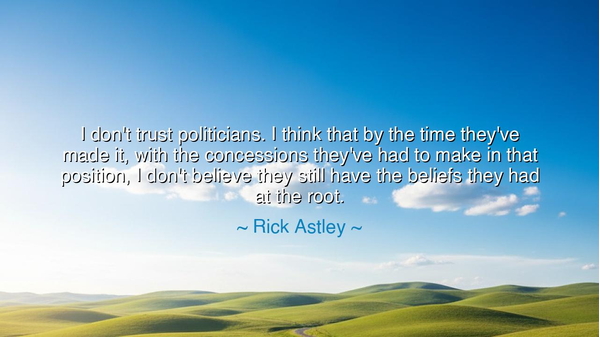
I don't trust politicians. I think that by the time they've made
I don't trust politicians. I think that by the time they've made it, with the concessions they've had to make in that position, I don't believe they still have the beliefs they had at the root.






Hear the unadorned words of Rick Astley, the singer whose voice carried melodies into the hearts of millions, yet whose gaze turned with suspicion toward the realm of power: “I don’t trust politicians. I think that by the time they’ve made it, with the concessions they’ve had to make in that position, I don’t believe they still have the beliefs they had at the root.” In this statement burns no cynicism for its own sake, but a lament over how purity of conviction often erodes in the climb toward authority. It is a recognition of the corrosion that ambition and compromise can inflict upon the human soul.
The meaning is clear and timeless: those who enter the arena of politics often begin with noble ideals, but the system itself demands bargains, compromises, and sacrifices of principle. By the time they rise to prominence, the very beliefs that brought them into the struggle may be bent, bartered, or broken. Astley declares his lack of trust not necessarily in the idea of governance, but in the frailty of human nature when exposed to the temptations of power. It is a cry for integrity, and a warning that the path to prominence is paved with concessions that can hollow out the spirit.
The origin of these words lies in Astley’s own outsider perspective. As a musician and performer, he stood apart from the machinations of politics, observing it not from within, but with the eyes of one who valued authenticity. His own craft demanded sincerity of expression; his songs, to resonate, required truth of feeling. Thus, when he looked to politics, where masks are worn and deals are struck, he saw a contrast—a world where sincerity seemed to die under the weight of expediency. From this vantage, his distrust is not mere bitterness, but an artist’s yearning for honesty.
History itself provides countless witnesses to this truth. Consider the French Revolution, where men like Robespierre began with fiery devotion to liberty and equality. Yet as they rose higher, making concessions to power, their ideals hardened into dogma, and the Revolution devoured its own children. Robespierre, once a voice of the people, became an architect of terror. The beliefs at the root were consumed by the lust for control. Here we see precisely the danger Astley speaks of: noble beginnings corrupted by compromise and ambition.
Yet we must also remember those who resisted such erosion. Abraham Lincoln, rising through the storms of civil war, was pressed on all sides to make concessions that would betray the heart of his cause. Yet he clung to the root—his conviction that the Union must endure, and that freedom must extend to the enslaved. Though politics demanded bargains, he never lost sight of the higher purpose. Such figures are rare, but they remind us that though difficult, it is possible to reach power without abandoning one’s soul.
The lesson for us is sobering. We must be wary of placing blind trust in leaders, remembering that power always tempts, and that even the noblest among us may falter. Yet this truth should not drive us to despair, but to vigilance. We must hold leaders accountable, measure their deeds against their words, and remind them of the beliefs they once proclaimed. For the people are not helpless spectators; they are guardians, tasked with calling their leaders back to their roots.
Therefore, beloved listener, carry this wisdom into your own life: beware the small concessions that erode your character. Even outside politics, every man and woman faces the temptation to betray their roots for convenience, for approval, or for advancement. Guard your convictions. Be willing to bend in charity, but not in principle. Let your word remain true, and let your beliefs remain steadfast, even when the path of compromise seems easier.
So remember Rick Astley’s words: “I don’t trust politicians… I don’t believe they still have the beliefs they had at the root.” Take them not as a call to despair, but as a call to vigilance and integrity. Demand honesty of those who lead you, and demand it also of yourself. For in a world where power often corrupts, the greatest victory is not to ascend to power, but to remain faithful to the truth that first lit your path.






AAdministratorAdministrator
Welcome, honored guests. Please leave a comment, we will respond soon